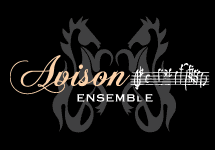Charles Avison's Workbooks project
Music manuscripts of Newcastle's famous 18th century composer
The Avison Ensemble is delighted to have received a Heritage Lottery Fund (HLF) award towards an exciting project to publicise and explore Charles Avison’s Workbooks.
 Made possible by money raised by National Lottery players, the project focuses on two autograph manuscripts by Avison and it will explore the importance of the Workbooks to the North East’s heritage through a series of events from May 2017 to May 2018, including schools learning projects in Newcastle, Northumberland and County Durham and the opening of a new Avison Archive at the Charles Avison Building – Newcastle City Library.
Made possible by money raised by National Lottery players, the project focuses on two autograph manuscripts by Avison and it will explore the importance of the Workbooks to the North East’s heritage through a series of events from May 2017 to May 2018, including schools learning projects in Newcastle, Northumberland and County Durham and the opening of a new Avison Archive at the Charles Avison Building – Newcastle City Library.
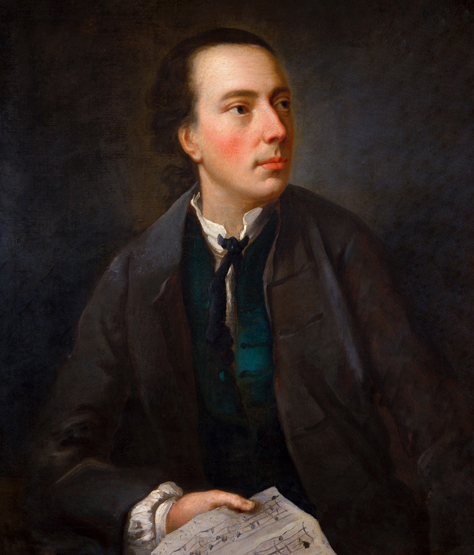 People of all ages will have the chance to discover for themselves the importance of music from the Workbooks, which has been unheard for over 250 years, and to understand its relevance today to the North East’s cultural heritage. Songs sympathising with the Jacobite rebellion of 1745 have been discovered in the Workbooks and these could shed an interesting light on North East political sentiments and discontented Scots over 250 years ago!
People of all ages will have the chance to discover for themselves the importance of music from the Workbooks, which has been unheard for over 250 years, and to understand its relevance today to the North East’s cultural heritage. Songs sympathising with the Jacobite rebellion of 1745 have been discovered in the Workbooks and these could shed an interesting light on North East political sentiments and discontented Scots over 250 years ago!
Period instruments will be used by the Avison Ensemble to recreate the sound world that people of Avison’s time would have known. Public events comparing the crafts of Avison and the wood engraver Thomas Bewick will enable contemporary audiences to better understand the importance of Avison’s Workbooks and their significance to our heritage.
Working with heritage professionals from the Library and the Literary and Philosophical Society the project will be able to give a greater exposure to these fascinating documents, and the Avison Ensemble’s ‘Wandering Minstrels’ schools learning team will help North East children to learn more about their musical heritage.
Charles Avison's Workbooks
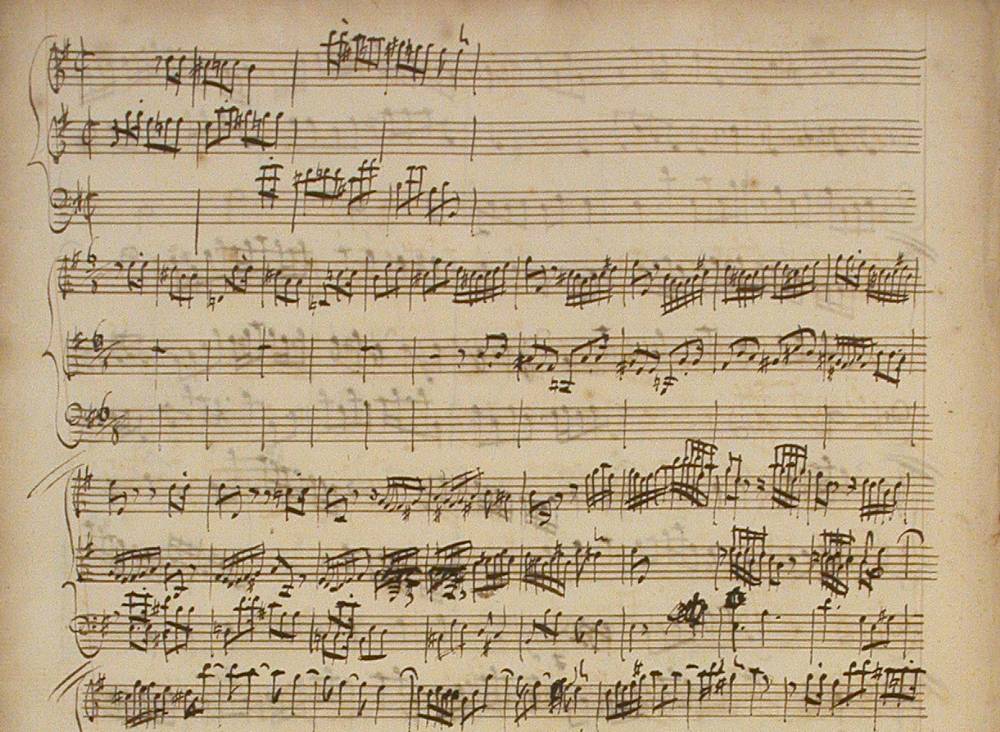 Charles Avison (1709 - 1770) was the most important English concerto composer of the 18th century, as well as being a concert organiser in Newcastle upon Tyne and organist of St. Nicholas’s Church, now Newcastle Cathedral.
Charles Avison (1709 - 1770) was the most important English concerto composer of the 18th century, as well as being a concert organiser in Newcastle upon Tyne and organist of St. Nicholas’s Church, now Newcastle Cathedral.
Autograph manuscripts by Avison were practically unknown until the Avison Ensemble acquired his two music Workbooks in 2002. After restoration funded by the Heritage Lottery Fund, the Workbooks have been on loan to Newcastle’s City Library housed in the Charles Avison Building and the music contained in them has been played and recorded by the Avison Ensemble.
The Workbooks provide a rare glimpse into how Avison and many other 18th century composers devised their
music, as well as containing previously unknown pieces by Avison and transcriptions of music by others. There is music by Avison’s teacher and friend, the Italian musician Francesco Geminiani, who profoundly influenced Avison’s own compositional technique. Also included are Avison’s transcriptions of music by Francesco and Stephani Scarlatti, neither of whose music appears to have been published. Many of these works would have been performed at Avison’s own concerts.
In these two volumes five hands can be easily identified. One of these is Avison’s own, with the others possibly belonging to his sons Edward and Charles, or to his pupils.
These manuscripts are of great importance to the cultural history of Newcastle and North East England and to our understanding of the musical world in England during the18th century. They add considerably to our knowledge of Avison’s music whose importance as a composer has now been secured thanks to the efforts of the Avison Ensemble, which was formed over thirty years ago to promote the music of Avison and his contemporaries.

Project activities
The Wandering Minstrels primary schools project
As well as the yearlong project of concerts and events listed below our Wandering Minstrels education team has also been visiting primary schools in the North East region providing workshops that explored local heritage with particular focus on North East music and songs. Our Minstrels reached primary school children in County Durham, Northumberland and Tyneside with lively sessions of music, singing, dancing and learning. They also introduced period instruments such as the harpsichord and viol and placed these instruments and the music written for them in the context of local history, as well as introducing them to the basic principles of acoustics.
Avison Workbook on display in Wesleyana Exhibition
6 May - August 2017 | Newcastle Collection Showcase, Level 6, Newcastle City Library
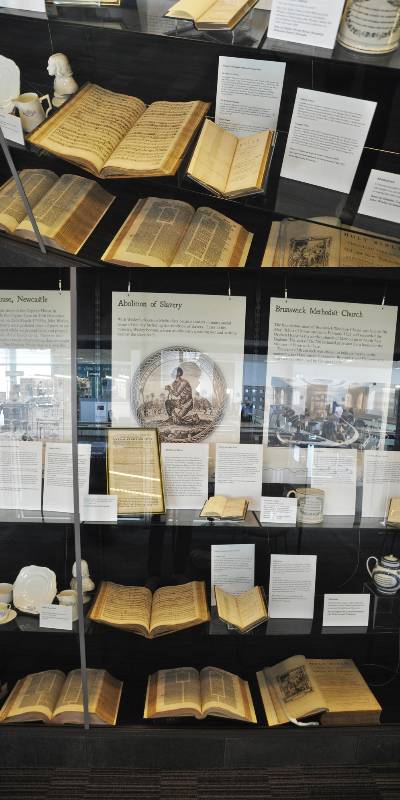 One of Charles Avison's Workbook was on display in the Wesleyana exhibition which celebrated the life and times of John Wesley, one of the most outstanding figures of the 18th century and the founder of Methodism in both Great Britain and America.
One of Charles Avison's Workbook was on display in the Wesleyana exhibition which celebrated the life and times of John Wesley, one of the most outstanding figures of the 18th century and the founder of Methodism in both Great Britain and America.
The exhibition included Methodism memorabilia, items which belonged to John Wesley and a rare sighting of Cranmer's Great Byble in Englushe, copies of which were placed in churches by command of Henry VIII.
Avison was an associate of the Wesleys. Both of his sons became members of the Orphan House Methodist Society.
Click here for details of the Avison Collection that forms part of the Library's Newcastle Collection.
The Avison Ensemble Young Musicians' Awards 2017 Award Winners' Concert
6 May 2017 11am | The Literary and Philosophical Society, Newcastle
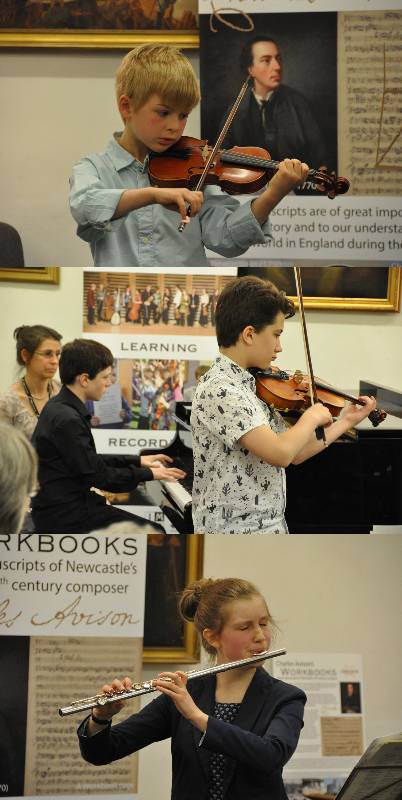 Our Award Winners' concert celebrated the best young musical talent in the region!
Our Award Winners' concert celebrated the best young musical talent in the region!
The concert included performances from the winners of this year's Young Musicians' Awards together with performances from some of the other finalists. The award winners were presented with their Awards and a year's free membership of the Literary and Philosophical Society's Library. Our concert is a great showcase of the young talent we have in the North East! To find out more about our annual Young Musicians' Awards click here.
One of Avison's Workbooks was on view during the concert and was introduced by the Ensemble's Executive Director.
The Late Shows 2017 at Newcastle City Library
20 May 2017 7pm - 11pm | Newcastle City Library
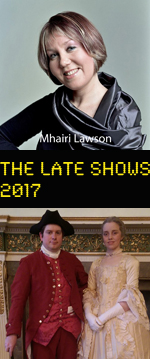 We were part of this year's Late Shows, the free late-night culture crawl in Newcastle and Gateshead where museums, galleries, studio collectives and landmark historical buildings come together to offer visitors one-off events. Read more about the Late Shows here.
We were part of this year's Late Shows, the free late-night culture crawl in Newcastle and Gateshead where museums, galleries, studio collectives and landmark historical buildings come together to offer visitors one-off events. Read more about the Late Shows here.
We were at Newcastle City Library where one of Avison's Workbooks could be viewed up close. Also John Treherne (harpsichord) and other musicians were joined by Mhairi Lawson (soprano) to perform music and songs from the Workbooks accompanied by dancers in period costume.
Each performance lasted about 10 minutes and we repeated them throughout the night. Thanks to the enthusiatic audience who joined us at City Library to explore the wonderful Workbooks and the music they contain!
Click here for more details on the event.
'The Italian Connection' concerts
20 September 2017 7:30pm | Bishop Auckland Town Hall
23 September 2017 7pm | The Literary and Philosophical Society, Newcastle
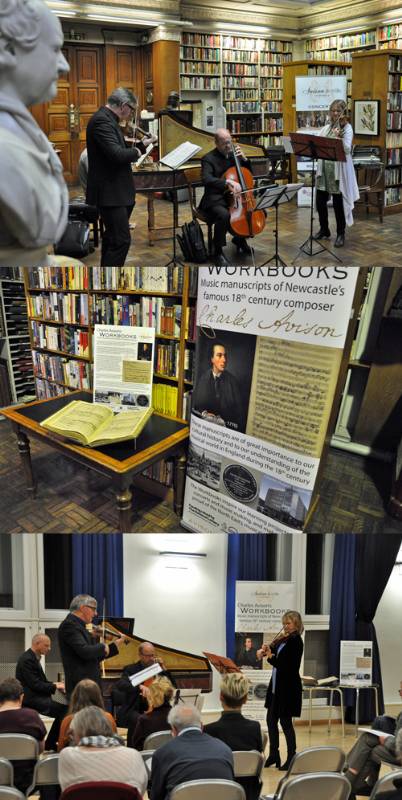 The principal members of the Avison Ensemble celebrated the legacy of Newcastle's 18th century composer Charles Avison by presenting a programme tracing the huge influence of Italian composers on English musical life in the 17th and 18th Century.
The principal members of the Avison Ensemble celebrated the legacy of Newcastle's 18th century composer Charles Avison by presenting a programme tracing the huge influence of Italian composers on English musical life in the 17th and 18th Century.
The concerts featured music by Avison, Corelli, Geminiani, Handel, Purcell and others. One of Avison's manuscript Workbooks was on view at the concerts and the Ensemble brought to life music from the Workbook during the concerts.
England, and particularly London, was a magnet for foreign musicians, and concert audiences flocked to hear the latest musical styles as they arrived from continental Europe. After his formative years in Rome where he played with the legendary Arcangelo Corelli, Handel moved to London where his assimilation of Italian style led to his dominance, particularly in the world of opera. Geminiani and Veracini were just two of many itinerant musicians who came to London in the 18th century seeking their fortune.
Our namesake, Charles Avison, studied in London with Geminiani before becoming England’s most prolific producer of ‘Concerti Grossi’ and running an extremely successful and long-lived concert series in his home town of Newcastle upon Tyne.
Performance workshop with sixth form music students
20 September 2017 | Queen Elizabeth Sixth Form College, Darlington
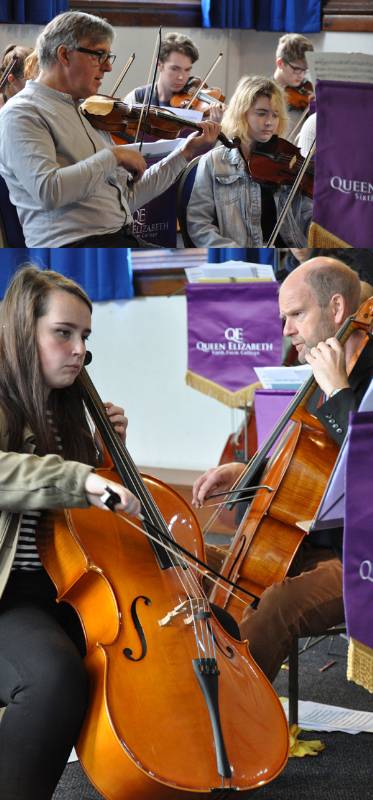 Our principal violinists, cellist and harpsichordist visited Queen Elizabeth Sixth Form College for a workshop on period performance and interpretation. We greatly enjoyed working with the orchestra and soloists on three concertos including John Garth’s Cello Concerto No 2 in B flat major. It was an intensive workshop focusing on period interpretation, style and performance practices with particular focus on interpretation of music from the North East and with reference to original scores. At the end of the workshop the orchestra presented a concert to an invited audience of students from other schools in the area.
Our principal violinists, cellist and harpsichordist visited Queen Elizabeth Sixth Form College for a workshop on period performance and interpretation. We greatly enjoyed working with the orchestra and soloists on three concertos including John Garth’s Cello Concerto No 2 in B flat major. It was an intensive workshop focusing on period interpretation, style and performance practices with particular focus on interpretation of music from the North East and with reference to original scores. At the end of the workshop the orchestra presented a concert to an invited audience of students from other schools in the area.
We were delighted to be involved in this workshop to engage and explore this wonderful music with enthusiastic young players. A significant outcome of our workshop was the formation of the Queen Elizabeth Baroque Ensemble who went on to record, edited and produce a CD recording of Baroque music by the North East composers Charles Avison and John Garth, as well as music by Corelli, Handel, Purcell and Vivaldi.
'Carving Wood, Carving Sound' lecture recital
10 November 2017 6pm | The Literary and Philosophical Society, Newcastle
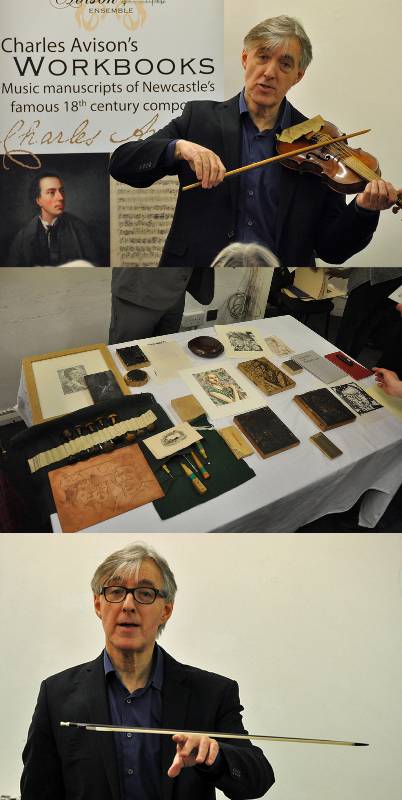 This lecture recital by Pavlo Beznosiuk (violin) and Chris Daunt (wood engraver) juxtaposed the evolutions of the violin bow and wood engraving from the 18th century.
This lecture recital by Pavlo Beznosiuk (violin) and Chris Daunt (wood engraver) juxtaposed the evolutions of the violin bow and wood engraving from the 18th century.
The violin bow of the 18th century was a very different tool to its modern counterpart. It was simple in construction but capable of a far more varied repertoire of nuanced strokes. Renowned Baroque violinist and our principal violinist Pavlo Beznosiuk charted the history and development of the violin bow and showed the very specific musical and technical advances made by violinists of the18th century.
Wood engraving is a print making process that grew out of the technique of the woodcut. Master wood engraver Chris Daunt showed how wood engraving developed from the desire to achieve a finer line and greater tonal range than the wood cut, as well as the need to be able to print images alongside moveable type.
Chris explained how Thomas Bewick (1753-1828) from Gateshead perfected the art of wood engraving to a level that has, arguably, not been surpassed. Chris explained how wood engraving became the main method for producing publication images in the 19th century and went on to become a fine art in the early 20th century. Chris described the process from the point of view of a practicioner and teacher and had a selection of tools, blocks and prints on view.
As part of this event we were able to explore the heritage and legacy of Charles Avison’s music by displaying one of Avison's manuscript music Workbooks from the 1750s. It was highly appropriate that in addition to this lecture recital about the mechanics of making music and printing we were able to make this Workbook available to view at this event to show the mechanics of music composition.
The Avison Ensemble Young Musicians' Awards 2018 Finals
10 March 2018 9am | The Literary and Philosophical Society, Newcastle
 Our annual Young Musicians' Awards is an opportunity for young classical musicians in the North East region to perform in front of a live audience and be given advice and encouragement from a panel of professional musicians. Entrants are judged not only on their perfornances but more importantly on their progress between the First Round Assessments and the Finals.
Our annual Young Musicians' Awards is an opportunity for young classical musicians in the North East region to perform in front of a live audience and be given advice and encouragement from a panel of professional musicians. Entrants are judged not only on their perfornances but more importantly on their progress between the First Round Assessments and the Finals.
The Young Musicians' Awards 2018 Finals were held on Saturday 10th March 2018 at the Literary and Philosophical Society, Newcastle. The Awards assessors heard sixteen finalists for the four categories of Grades 1-3, Grades 4 - 6 and Grades 7 and 8 and Grade 8 and above, and one ensemble. The winners will perform at our Awards Winners' Concert on Saturday 28th April 2018 at the Lit and Phil where they will be presented with their Awards engraved with their names. Click here for details of this event.
To find out more about our annual Young Musicians' Awards click here.
We were delighted to be able to show one of Charles Avison's music manuscript Workbooks at this event and it was good to see so many people exploring this unique piece of Newcastle's heritage.
 We're grateful to The Literary and Philosophical Society for hosting this year's Finals and for generously presenting each of the winners with a year's membership of their Library.
We're grateful to The Literary and Philosophical Society for hosting this year's Finals and for generously presenting each of the winners with a year's membership of their Library.
The Avison Ensemble Young Musicians' Awards 2018 Award Winners' Concert
28 April 2018 11am | The Literary and Philosophical Society, Newcastle
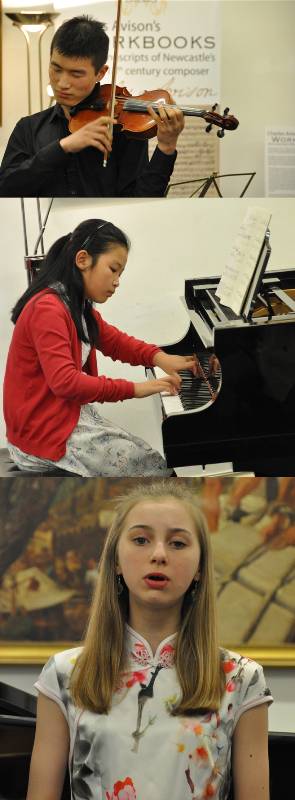 Our Award Winners' concert celebrated the best young musical talent in the region!
Our Award Winners' concert celebrated the best young musical talent in the region!
The concert included performances from the winners of this year's Young Musicians' Awards. The award winners were presented with their Awards and a year's free membership of the Literary and Philosophical Society's Library. Our concert is a great showcase of the young talent we have in the North East! To find out more about our annual Young Musicians' Awards click here.
We were delighted to be able to once again show one of Charles Avison's music manuscript Workbooks at this event and it was good to see so many people exploring this unique piece of Newcastle's heritage. The Ensemble's Executive Director introduced the Workbook and our project to the audience.
Charles Avison Exhibition: exploring the history and heritage of Britain's foremost concerto composer
9 May - 31 July 2018 | Newcastle Collection Showcase, Level 6, Newcastle City Library
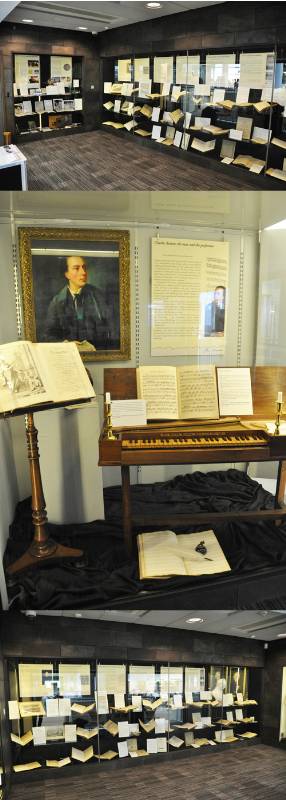 Our exhibition 'Charles Avison: exploring the music and heritage of Britain's foremost concerto composer' was held in the Newcastle Collection Showcase on Level 6 of Newcastle City Library (the Charles Avison Building!) from 9th May to 31st July 2018.
Our exhibition 'Charles Avison: exploring the music and heritage of Britain's foremost concerto composer' was held in the Newcastle Collection Showcase on Level 6 of Newcastle City Library (the Charles Avison Building!) from 9th May to 31st July 2018.
Avison was Newcastle’s 18th century concert organizer and Britain’s foremost concerto composer. This exhibition explores and celebrates Avison’s life and career and his importance to Newcastle’s heritage and the history of British music through examples of his music compositions and works. It included a rare opportunity to view his two manuscript Workbooks – these Workbooks are very rare survivals showing how 18th century composers wrote their music. The exhibition also showcased the international revival of Avison’s music and reputation by the Avison Ensemble.
Autograph manuscripts by Avison were practically unknown until the Avison Ensemble acquired his two autograph music Workbooks in 2000/2002. The Workbooks provide a rare glimpse into how Avison and other 18th century composers devised their music, as well as containing previously unknown pieces by Avison and transcriptions of music by others. These manuscripts are therefore of great importance both to the cultural history and heritage of Newcastle and the North East and to our understanding of the musical world in England in the 18th century.
First editions of Avison’s works and other related heritage items were lent to the exhibition by Newcastle City Library, Newcastle’s Literary and Philosophical Society, the Avison Ensemble, Durham University Music Library and a private lender.
Two exhibition lectures:
The man they named the library after: Charles Avison – making money and music: lecture by Dr Roz Southey
Friday 11 May 2018 2:30pm | Newcastle City Library
Charles Avison's musical legacy and his impact as a composer and author: lecture by Dr Simon Fleming
Saturday 19 May 2018 2pm | Newcastle City Library
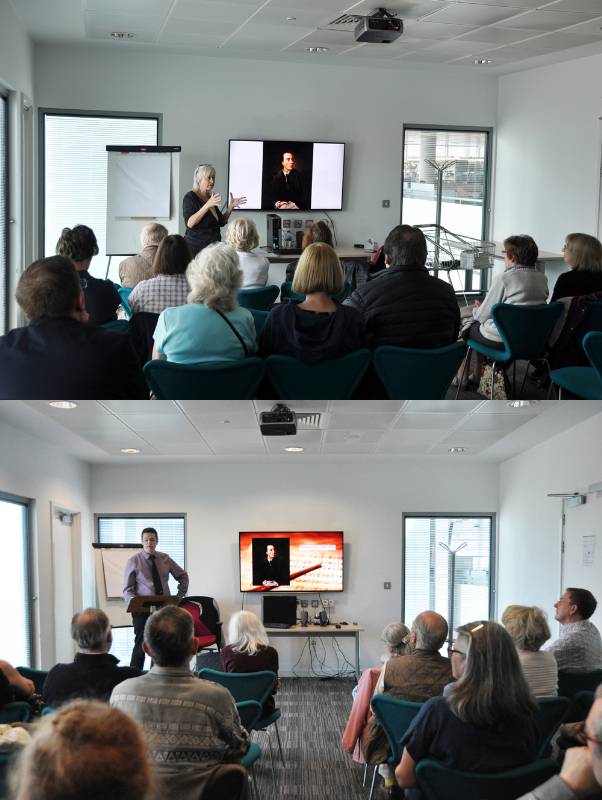 As part of the Charles Avison Exhibition Dr. Roz Southey and Dr. Simon Fleming explored Avison - the man, his career and his legacy.
As part of the Charles Avison Exhibition Dr. Roz Southey and Dr. Simon Fleming explored Avison - the man, his career and his legacy.
Dr. Southey's lecture explored Avison's ingenuity in making music and money in Newcastle. Eighteenth century England saw a massive growth of consumerism in leisure activities – including horse-racing, cock-fighting, the theatre, novels, and music. The middle classes became increasingly rich and were looking for things to spend their money on. Newcastle-born Charles Avison was one of those who took advantage – an excellent businessman as well as an outstanding musician, Avison provided concerts, instruments, music and teaching for men and women in the town with time and money on their hands.
In the process, he made himself wealthy in a profession that was usually very precarious. Although there were occasional setbacks on the way …
Dr. Fleming's lecture explored the importance of Charles Avison and his compositions to the history of British music. His music was widely performed in his lifetime and in the early 19th century, and his name and significance was kept alive through not only his music but also his writings on music theory. Exploring the revival of interest in Avison’s music, the talk will consider the recent reassessment of his importance not only to Newcastle’s heritage but also his significance as a composer of national importance.
After both lecture there were brief introductions by the exhibition curator to the Charles Avison Exhibition at the Newcastle Showcase on Level 6.
The Late Shows 2018 at Newcastle City Library
Saturday 19 May 2018 7pm - 9pm | Newcastle City Library
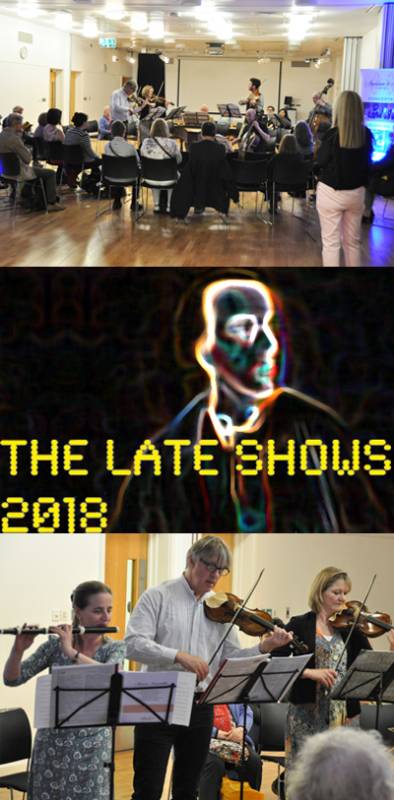 As part of this year’s Newcastle and Gateshead Late Shows 2018 we explored Charles Avison’s music manuscript Workbooks through drop-in showcase performances. One of Avison's Workbooks was on display throughout the performances allowing the audience to explore Newcastle’s musical heritage for themselves while they listened to the music being performed. We also performed music by Handel and a rare flute concerto by Vivaldi, and also a cello concerto by Avison’s contemporary Durham’s John Garth.
As part of this year’s Newcastle and Gateshead Late Shows 2018 we explored Charles Avison’s music manuscript Workbooks through drop-in showcase performances. One of Avison's Workbooks was on display throughout the performances allowing the audience to explore Newcastle’s musical heritage for themselves while they listened to the music being performed. We also performed music by Handel and a rare flute concerto by Vivaldi, and also a cello concerto by Avison’s contemporary Durham’s John Garth.
We also ran introductions to the Charles Avison Exhibition that is on display on Level 6 of City Library until 31st July 2018. This exhibition explores and celebrates Avison’s life and career and his importance to Newcastle’s heritage and the history of British music. Avison’s Workbooks and first editions of his scores are on display.
The Late Shows is an annual free late-night culture crawl across Newcastle and Gateshead where museums, galleries, studio collectives and landmark historical buildings come together to offer visitors one-off events including hands-on workshops, behind-the-scenes tours, performances and parties. It's all about encouraging people to do something cultural with their evening in celebration of the national event Museums at Night. Click here to find out more about The Late Shows.
'Charles Avison's Workbooks come alive!' concert
Sunday 20 May 2018 2pm | The Literary and Philosophical Society, Newcastle
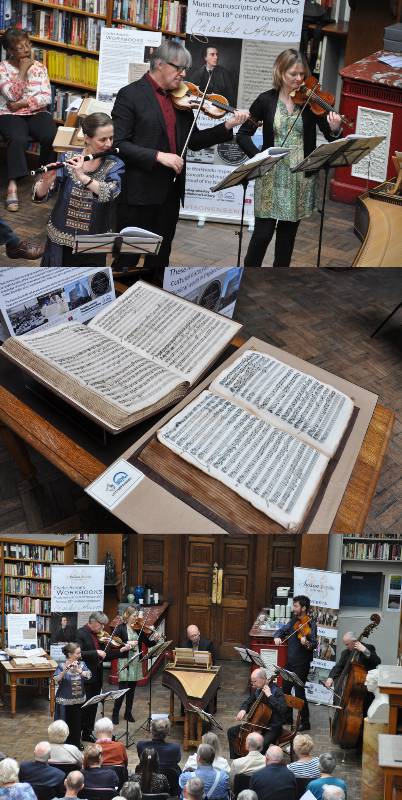 We ended our yearlong Heritage Lottery-funded project exploring Newcastle's 18th century composer Charles Avison and his two music Workbooks with a celebration concert of music from his Workbooks and music by his contemporaries. One of Avison’s Workbooks was on view at the concert and the Ensemble brought life some of the wonderful music contained in it and its fellow Workbook.
We ended our yearlong Heritage Lottery-funded project exploring Newcastle's 18th century composer Charles Avison and his two music Workbooks with a celebration concert of music from his Workbooks and music by his contemporaries. One of Avison’s Workbooks was on view at the concert and the Ensemble brought life some of the wonderful music contained in it and its fellow Workbook.
The programme included:
Avison’s Concerto Grosso op. 6 no. 1 in G minor - Avison’s autograph score of his Concerto op. 2 no. 1 (published 1740) is found in his second Workbook. He later revised and reissued this work as his Concerto op. 6 no. 1 (published 1758).
Avison’s Concerto after Francesco Geminiani’s Sonata for Violin and Basso Continuo op. 1 no. 3 in E minor - Avison’s autograph scores in his second Workbook are the only known source for his concerto grosso arrangements of Geminiani’s Sonatas op. 1.
Avison’s Concerto Grosso after Domenico Scarlatti no. 6 in D major -Avison’s autograph scores of the second and fourth movements of this concerto are found in his second Workbook.
The Ensemble also performed Francesco Scarlatti’s Concerto no. 11 - the only known source for Francesco Scarlatti’s eleven concerti grossi is Charles Avison’s first Workbook where they are noted as ‘Sonate da Sigr. Francesco Scarlatti’.
Avison’s contemporaries were represented by performances of John Garth’s Cello Concerto op. 1 no. 1 in D major; Handel’s Concerto Grosso op. 3 no. 3 in G major HWV314; and a rare performance of Vivaldi's flute concerto Il Gran Mogol (The Grand Moghul) in D minor RV431a – this concerto had been lost since 1759 and only rediscovered in 2010.
